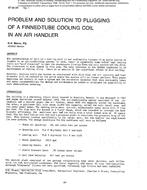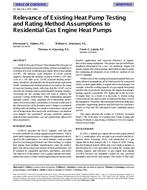A new borehole configuration is proposed in this study in an attempt to reduce the required length of ground heat exchangers (GHE) in cooling-dominated climates. It consists of a single U-tube borehole surrounded by a ring made of a thermally enhanced phase change material (PCM) mixed with sand.
With a properly designed PCM ring around the borehole, a significant portion of the rejected heat during peak building loads is used to melt a PCM. This slows down the increase in the return temperature to the heat pump. In nonpeak periods when the heat pump is not operating, thermal energy stored in the ring is released into the ground by heat conduction. In the process, the PCM ring solidifies and is then ready for the release of heat during the next heat pump operation cycle. By taking advantage of the relatively high energy content associated with the latent heat of fusion of PCM, the PCM ring may reduce the required borehole length. This paper presents the numerical model used to obtain the temperature distribution around the borehole and in the PCM ring. Several annual simulations were undertaken to evaluate the merits of the proposed borehole configuration in a cooling-dominated climate. Preliminary results show that the proposed configuration can reduce the borehole length by up to 9%.
Product Details
- Published:
- 2013
- Number of Pages:
- 10
- File Size:
- 1 file , 2.5 MB
- Product Code(s):
- D-DE-13-028
- Note:
- This product is unavailable in Russia, Belarus


